This interview was originally published on Game World Observer on February 06, 2020.
Ministry of Broadcast is a narrative-driven cinematic platformer released on January 30. The game is set in a dystopian country divided by the Wall, and to get to the other side, you must survive the reality show run by the omnipresent Ministry of Broadcast. Expect traps, tons of moral ambiguity, and brilliantly somber humor in the vein of Monty Python.
The team behind the game is eponymously named Ministry of Broadcast. It consists of four people: Petr Škornok, Dušan Cezek, Sanja Cezek, and Petr Melicherík [Spelling changed. Had to remove some caron signs due to word processor restrictions].
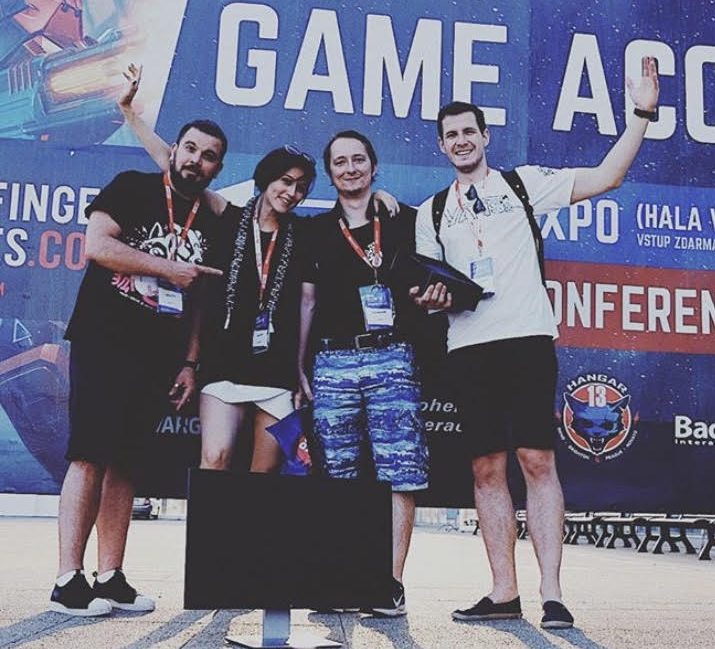
From left to right: Dušan Cezek, Sanja Cezek, Petr Melicherík and Petr Škornok
I was lucky to catch up with half of the studio represented by Petr Škornok​ and Dušan Cezek. This interview took place on January 31, the next day after the game came out.
Rise of Ministry of Broadcast

Oleg Nesterenko, managing editor at GWO: Let’s start with the beginning. How did the four of you meet and decide to become a studio?
Petr: It all started with me and my friend Pete. We are two Petes (Twin Petes). We’ve been programmers for a while, but we always wanted to make games, so we thought, “Hey, this is our last chance to make games before we have mortgages and babies and wives. Let’s try to make a game we always wanted.” We started looking for designers and artists and we found some nice pictures of the creations that Dušan and Sanja made. So we wrote them an email. This was the beginning from our side.
At that point, did you already have a specific idea for a future game?
Petr: Yeah, we had this idea for a game set in dystopian world, which was inspired by Orwell’s 1984. Originally though, it was supposed to be a 2D shooter. It was the very first prototype that we made. The player had to clear a series of arenas, each culminating in a boss fight. Obviously, it’s totally changed the direction since then.
Dušan: The only thing left from the original prototype is the arenas Pete mentioned. We kept them, and they became the core of the gameplay. There was a lot of brainstorming around it, and the game grew enormously. We started with around 50 or 60 assets and we ended up with 7,200.
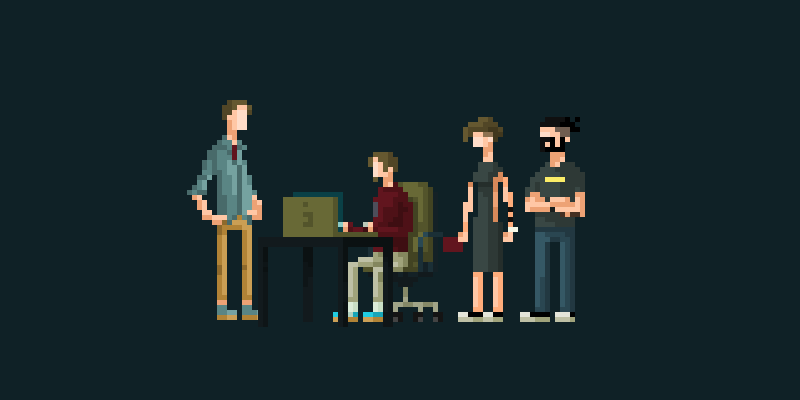
Ministry of Broadcast at work
As for our part of the story, Sanja and I escaped from the advertising background. We both finished art schools and universities. We were, you know, proper artists until a corporation grabbed us into advertising. For awhile it was ok, but then we just got tired. We wanted something different. So we opened our own studio Fuchs+Dachs to make the kind of art that we wanted. Now, we only work on projects we like, the ones that are good for us and our clients at the same time.
That’s how the four of us met: Pete and Pete saw our creations. We just clicked with them because Sanja and I were also playing games, and we wanted to make a game ourselves eventually.
We live in two different cities, Prague and Brno, but after we met several times, we realized that we had similar ideas, sense of humor, and similar stories to tell.
So we naturally merged into Ministry of Broadcast. That’s what we called our new studio. Because this game brought us together.
Petr: And I believe the first breaking point when we decided to continue working together and become one studio was after half a year of development. We created a demo and started going to conferences.
We went to Game Access in Brno, it was the second conference we attended. Pete and I came. Dušan and Sanja came too. We showcased the game to the audience together. And we felt like one team. It wasn’t like Dušan and Sanja working on just one part of the game and us working on the other part, but we just felt like, “Hey, we are doing the same thing! Let’s do this together and let’s find a way to do this full time, to fund the development.” Because back then, we were doing this part time after hours or during the weekends.
On conferences and publishers
Dušan: We won the Best Gameplay award at Game Access 2018 in Brno. And this award helped us reach Tokyo (Tokyo Game Show 2019) right after. It was a natural path to larger conferences, which we realized was our chance to grab publishers and funds.
Petr: We got lucky, and for the past year we’ve been working on a game full time. Well, no, it’s not about luck, I guess, because we visited so many conferences. We made a proper pitch and we tried to pitch the game to any publisher that was willing to listen to us. And at any conference we went to, we tried to find as many contacts as we could. So at the end of the day, it wasn’t about luck but about trying hard.
We found a publisher from Tokyo, it was PLAYSIM, and a publisher from the US, Hitcents. They helped us fund the rest of the development.
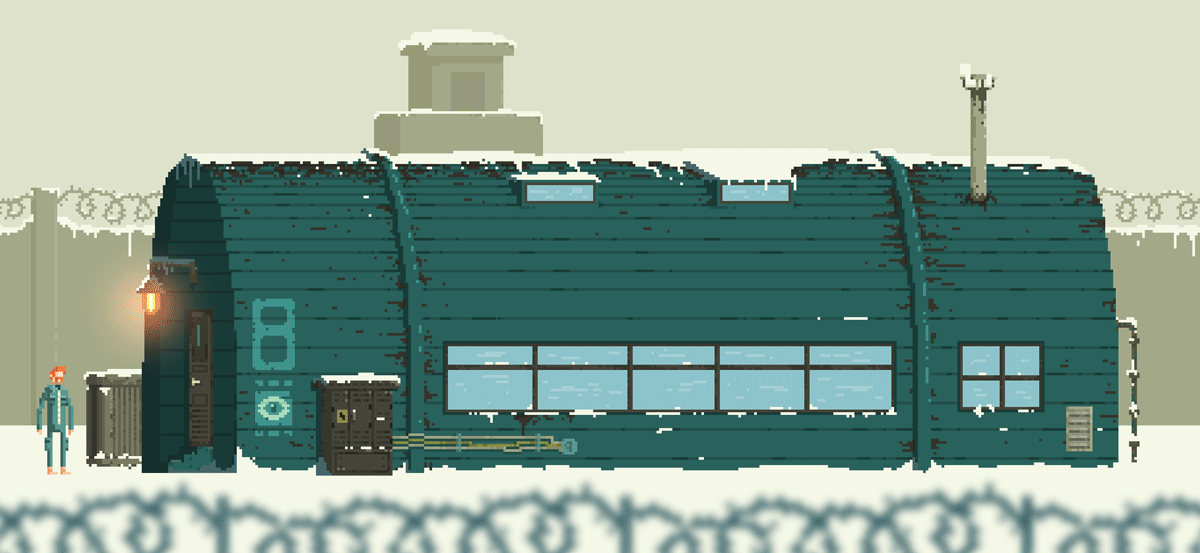
Ministry of Broadcast
Two publishers, huh?
Petr: PLAYSIM were the first ones we met. They focus on the Asian market, but we didn’t have a deal with them. Not at first. We were in talks with them for almost half a year. And in the meantime, we met Hitcents in the US at IndieCade in LA, and they wanted to publish our game. They were able to fund the development, but in talks with them we agreed that they didn’t have much experience with the Asian market, and it would be better to have someone focused solely on that region, someone that understands its requirements. So we decided to market the game separately for different regions. Hitcents focused on Europe, the US, Australia, and PLAYSIM are the experts on Asia. It’s just smarter to separate your markets because you can achieve bigger sales and a bigger reach. And at the same time, it’s good for us because our revenues are not coming from one source. Plus, with two publishers, we achieved the full funding that we really needed.
Is there an Asian version of Ministry of Broadcast?
Petr: It had to be translated in Japanese, in Korean. Other than that, they didn’t change anything. Surprisingly.
Dušan: We do, however, have to make one small change for Switch. We need to cover some boobs. I guess we’ll just take those pixelated breasts and pixelate them even more.
You gotta do what you gotta do. For those of our readers, though, who are struggling to get even one publisher, do you mind telling us how you got two? You must have had a killer elevator pitch.
Dušan: Just one picture where we had really shitty graphics, and the writing said “Without your money, we can do this. And with your money, we can do this.” That was our shortest elevator pitch.
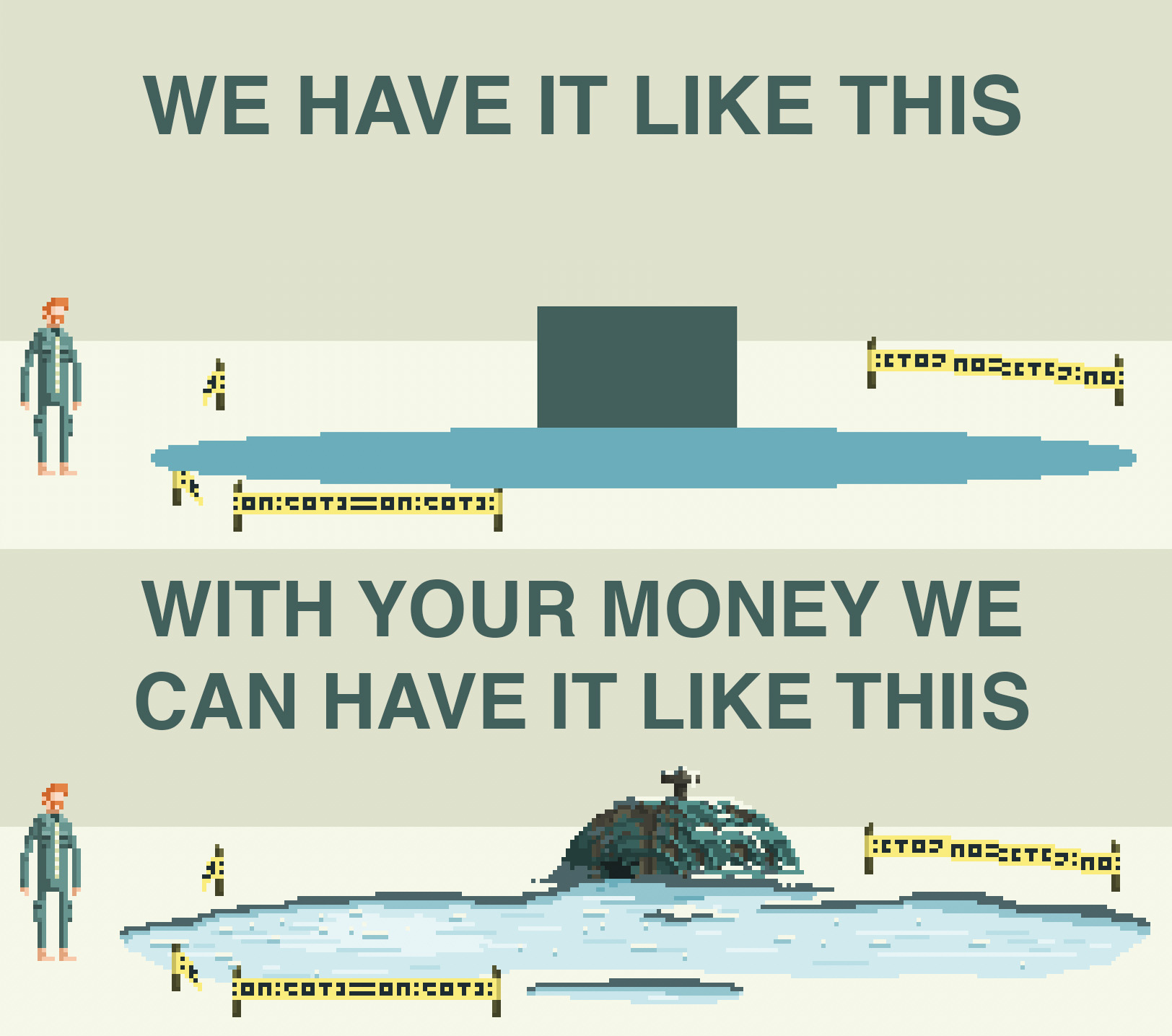
The shortest pitch for Ministry of Broadcast
Of course, we pitched with a proper pitch deck as well, but this particular elevator pitch was successful because it was selling the team as it is because we really like to be sarcastic in delivery. So we agreed that we were just going to go with our sense of humor through every pitch and to present ourselves as we are. We didn’t want to get into some bad relationship with publishers who would be hooked up on their own idea for a game and who would change a lot about our vision, and we would be in agony to finish the game.
So from the very beginning we were trying to kind of Tinder-date a publisher. You know? Both need to swipe right in order to work. So that was our approach to pitching.
Looks like you wasted no time at these indie events. You won the Best Gameplay award at Game Access 2018. You were nominated for Best Story, Most Original Game, Best Desktop Game at Game Connection 2018 in Paris. The list goes on. John Romero praised your game. Did it put a lot of pressure on you along the way? Did you feel like now you’d have to live up to all these expectations about your game?
Petr: We just wanted to make a game we would love to play. At the end of the day, it was important to be proud of ourselves as opposed to other people being proud of us. Of course, it meant a lot at the beginning to have John Romero play our game. He really liked it. It was at the beginning of our development, when we only had the first demo. So it gave us a little confidence. But afterwards, we never felt like we needed to make it the way people expected us to. We were just focusing on the things we love.
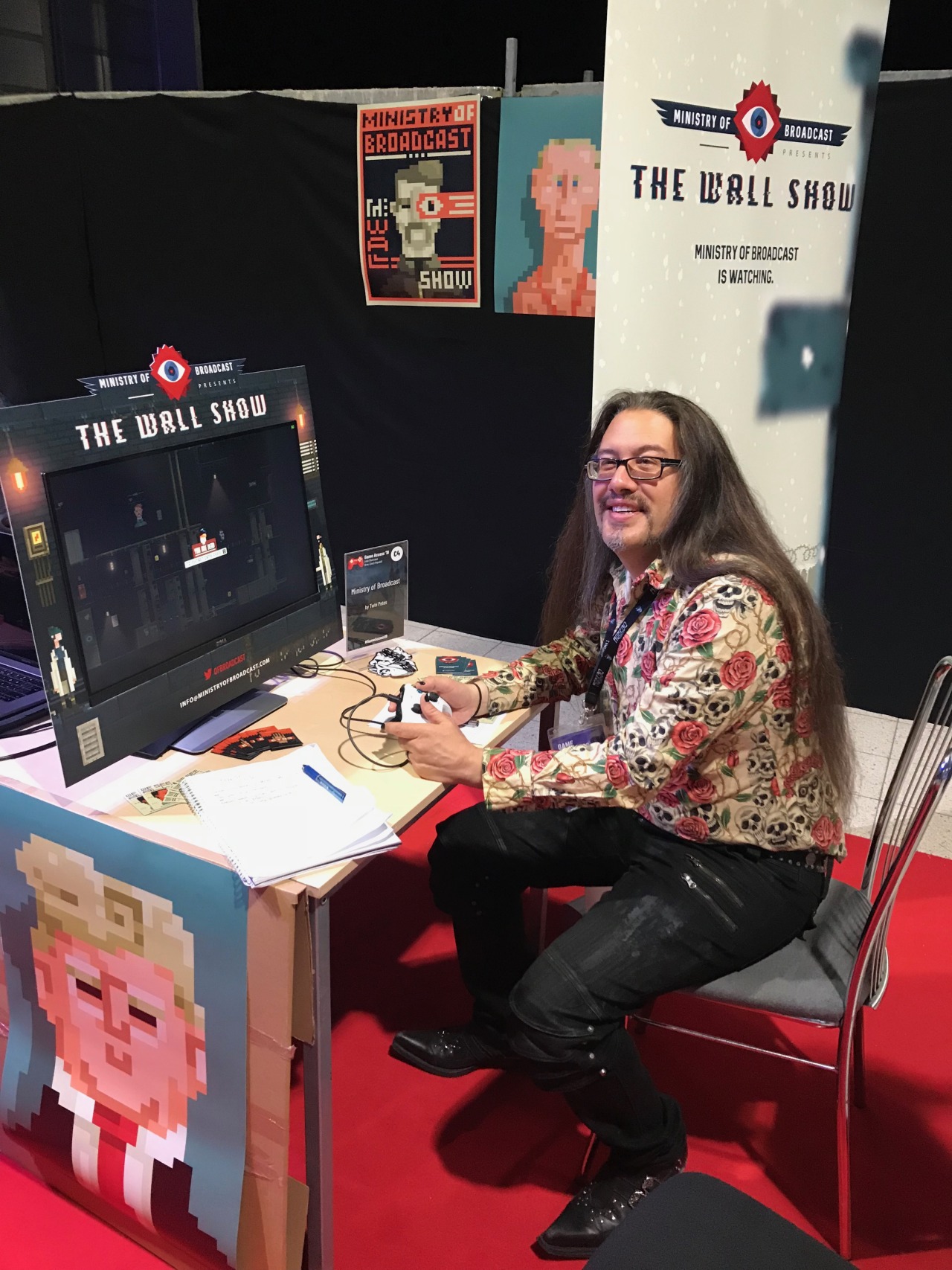
John Romero playing MoB at Game Access 2018
Are you saying you didn’t necessarily make the game to be a commercial success? I wonder what your publishers think of that.
Dušan: We never told them.
Petr: Just hoping they will also like it.
Dušan: That brings us back to the Tinder-date publishing. We really wanted to find the publisher who would understand what we were doing. The only thing that we were discussing with one of our publishers is whether we should have a happy ending or not. There is this cultural difference between the US and Europe. Since we are from Eastern Europe, we grew up on movies that are more realistic, where you don’t have to have happy endings that producers like so much. It’s the director that makes the movie the way they want. In the States though, they’re more accustomed to the producers editing the movies to make them suitable for a wider audience. That’s the only discussion that we have had with the publisher. Not in terms of whether we could do it or not, there was no fighting over that. Just in terms of which would have a bigger effect on the game. To keep it as an artsy European thing or to make it more commercial for the States. The rest of it was completely up to us, and we are really happy that they showed so much support and understanding towards the project.
And here you are, a proper studio. What are you responsibilities across the team?
Dušan: We are really strange that way, as a studio. We believe that we don’t have to have a structure per se. We don’t have specific roles. We have our backgrounds, of course. Which puts Sanja and me in charge of art and Pete and Pete in charge of development, but as for the rest of the game, we have round tables and discuss every single aspect of it together: gameplay, story, even sound design and music design. We like to hear everyone’s opinion. For now, it works given our size.
The world of Ministry of Broadcast
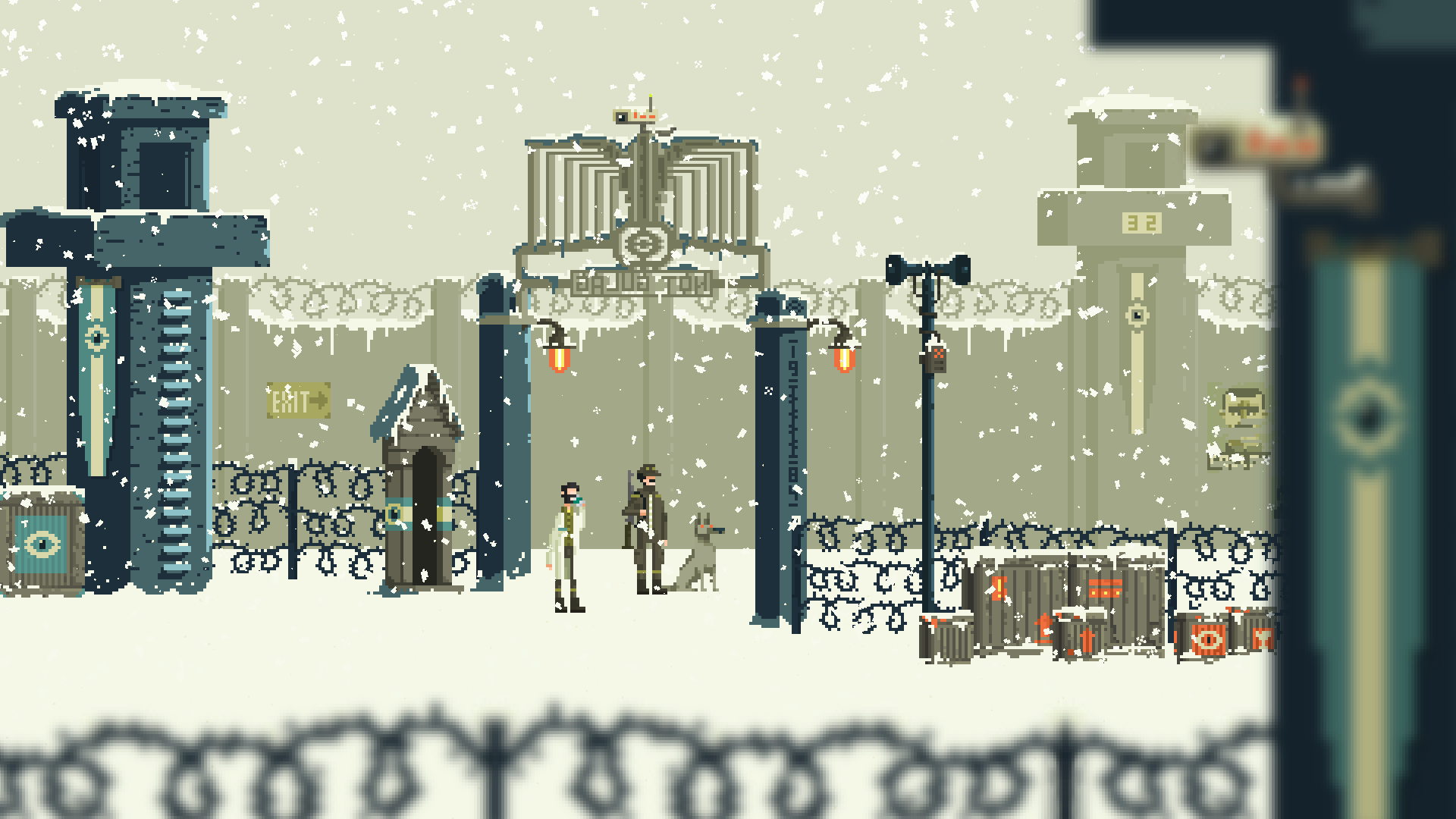
You said it started with a story. A story of a country divided by the wall. Where did that idea come from?
Petr: It’s the climate you could feel around you at that time. And even nowadays, Brexit is happening, isn’t it? People are getting separated all the time. Immigration. Leaders discussing who we should let in, who we shouldn’t let in.
This we connected with the Berlin wall, which was built overnight.
And we thought what if the regime on one side of the wall struck a deal with all the people who would like to escape the country? I mean, mostly they just say, “No, you cannot leave, you can’t get across the borders.” But what if they could control the escape? They would select people and make a show out of it.
Dušan: I’m going to make our publisher and PR team very happy with this story because they love it when devs put personal experiences into games. Sanja and I were born and grew up in Yugoslavia, which was like this nice utopian country. And during the nineties, the war broke out and separated the country. Nobody asked you if you wanted to live in this country. People stayed where they happened to be on that particular day. Overnight, we were cut off from the rest of the world. We suddenly needed visas to travel anywhere. We could only go out for a limited time. Some supplies were cut off. I remember we didn’t even have gasoline for cars, people were waiting for three or four days, just to have one tank filled. And the media played a huge part in this. There was a real war, and a media war.
We lived through it. We didn’t necessarily want to recreate this experience in the game, but it felt natural to talk about it. It just resonated with the vision of the world we live in now. How we are all connected through social media, but we are spying on ourselves, broadcasting everything, selling ourselves through reality shows. We’ve never felt more distant being the most connected at the same time.
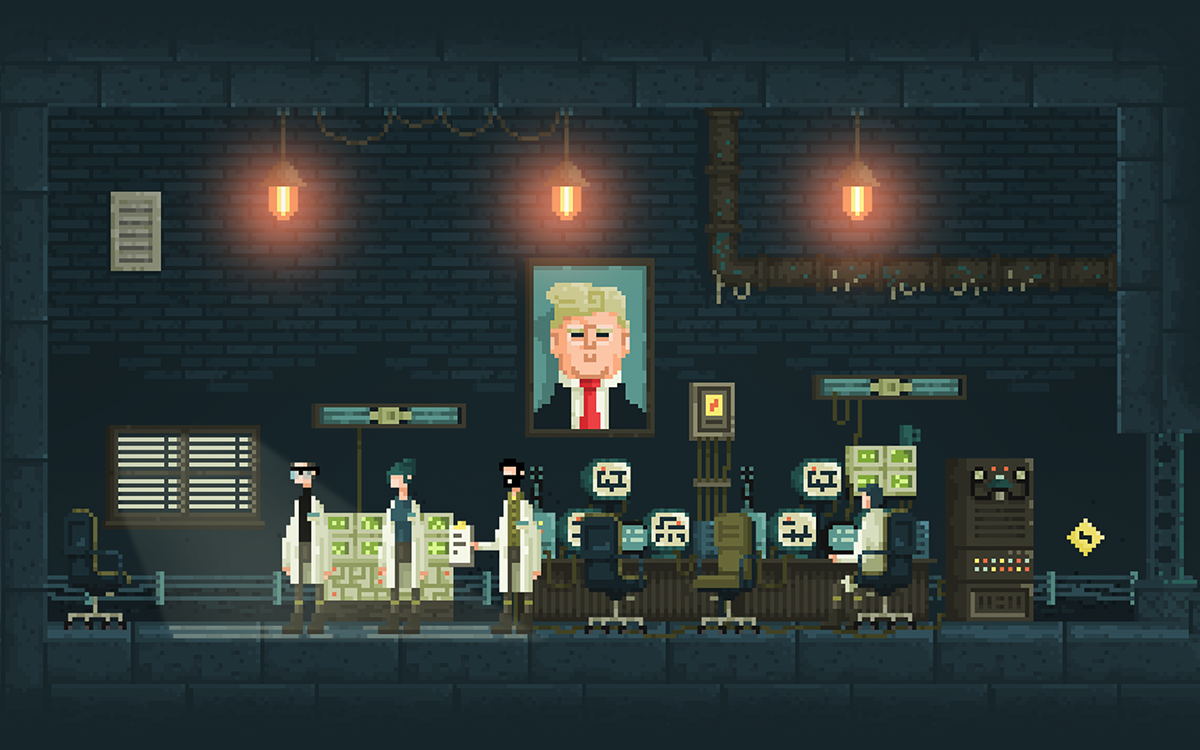
Subtle references in MoB
And that’s something that we really wanted to tackle. So, yes, the Trump wall is something that people in the States would mention, but there is North Korea in Asia, there was Berlin wall. We have our own walls today, Brexit and everything. I guess people like to build walls. And that’s something that’s really universal for all cultures.
Making Ministry of Broadcast: Level design, controls, genre, art, engine
Let’s talk development.

































